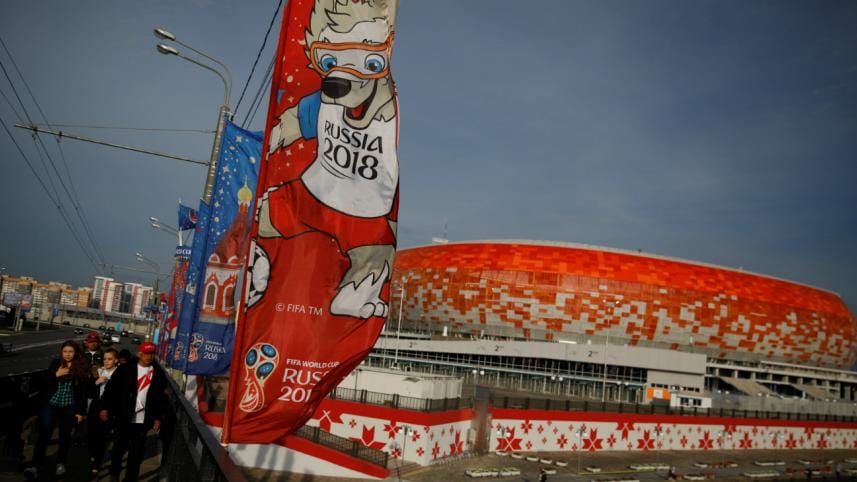One for all

The next month holds many stories, and the beautiful game has narrative thread and needle at the ready to weave a tapestry that its followers will know by heart and harken back to for years to come. That tapestry will consist solely of what happens across Russia's full-to-the-brim stadia. But there is another kind of narrative, arguably of lower quality as it comes not from the Telstar and high-skilled boots but from the mouths and pens of pundits and fans, that often does not wait for the first ball to be kicked in anger and instead waits till the kicking stops -- such as the end of the 2014 World Cup final.
Lionel Messi. When Mario Goetze slotted home that incredible, World Cup-clinching chested volley in 2014, along with winning Germany's much-deserved fourth World Cup, in some eyes he denied Lionel Messi the right to a place alongside Diego Maradona and Pele as the greatest to lace spiked boots.
No matter what he achieves at club level, and he has achieved remarkable things with Barcelona and continues to do so, somewhere deep inside even Messi knows that he will not be sent the form to fill in his GOAT (greatest of all time) credentials until he has the World Cup in his grasp.
Even though all this is accepted as footballing truth, a disconnect emerges when you dwell on it. Football is pretty much the definition of a team sport, so why should a team's results weigh so heavily upon how a bonafide great is remembered? There are 10 other men on the pitch, and surely they have to take an equal portion of the blame, or credit.
Not quite, and therein lies the elusive beauty of the sport. There are 11 highly skilled players on the pitch on one side, but when you think of World Cup winners you think Pele (1958), Maradona (1986), Ronaldo (2002) -- to name just three.
Part of what makes football so compelling is the seminal and sublime moment of goalscoring. The act that for most of the 90 minutes seems so unlikely -- a ball being kicked around towards a goal that is jealously protected and seemingly impenetrably until everything comes together, as if by magic, and one boot (and/or head) has the wherewithal to keep account of hounding defenders and traipsing goalkeepers to send the ball home.
Yes, there are 11 highly skilled pairs of boots on the ground, but they are all geared towards one thing -- feeding those two or three pairs of boots that are expected to score the goals. Formations have evolved over the years into a pattern that -- albeit with variations -- generally resemble a funnel for the ball to find its way into the opposition goal.
And at the pointy end of that funnel, when you are a Messi or Maradona, you are also responsible for driving the attack forward. Everyone remembers Maradona's hand-of-god goal and 'the goal of the century' in the 1986 quarterfinal against England, but his playmaking to Jorge Burruchaga gave Argentina the winner in the final against West Germany.
So, in a sport where goals that come about twice or thrice every match are all that matters, the designated scorers bear the brunt of the responsibility. It is then no surprise that the star forwards are the targets of the defence – witness Juan Zuniga's knee to Neymar's back in 2014, and Sergio Ramos's arm-drag takedown of Mohamed Salah in the recent Champions League final.
Just as they have to oversee, assist in the buildup and possibly pull the trigger on goals during a match, those stars also have to first take the team forward from the group stage, past the knockouts and finally, the final.
That is of course not to say that the other 10 are just dummies making up the numbers. Football is also a sport of scoring more than you concede, and therefore defensive lines and midfields are integral to a team's success. Additionally, the Messi example ignores teams like Germany and Italy, both of whom while having great players have profited from making the structure of their funnel so strong that it did not matter as much that an all-timer was waiting at the pointy end.
But this is not about the respective footballing philosophies of Europe and South America; it is about whether it is fair on Messi that his place in the pantheon hinges on Argentina's result. Fairness really does not enter into it. It is a privilege because, unlike his great rival Cristiano Ronaldo, he has the personnel around him that can make a difference and so a World Cup win is a real possibility in the first place. Portugal are not on a level, with or without Ronaldo, that may generate hopes of World Cup glory.
In that respect, Brazil's Neymar is closer to Messi. But unlike the 30-year-old Messi, the 26-year-old Neymar will get more bites at the cherry after this year. This may be the last for Messi, and certainly for the 33-year-old Ronaldo. But whoever wins this World Cup, the star frontman of that team can say that they were able to perform when it truly mattered. And perhaps that is what separates the great from the greatest in the eyes of posterity.
If Argentina win this World Cup, Messi's fans will forever have a leg-up on Ronaldo tragics as they can say that the Portuguese does not have a World Cup and so will always be a whit behind Messi. After all, once the dust has settled on Russia 2018, the fans' narrative will be the one that matters.
The writer is former Sports Editor of The Daily Star





Comments